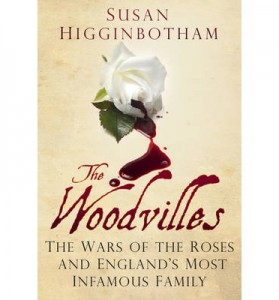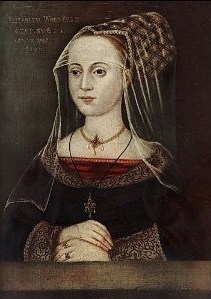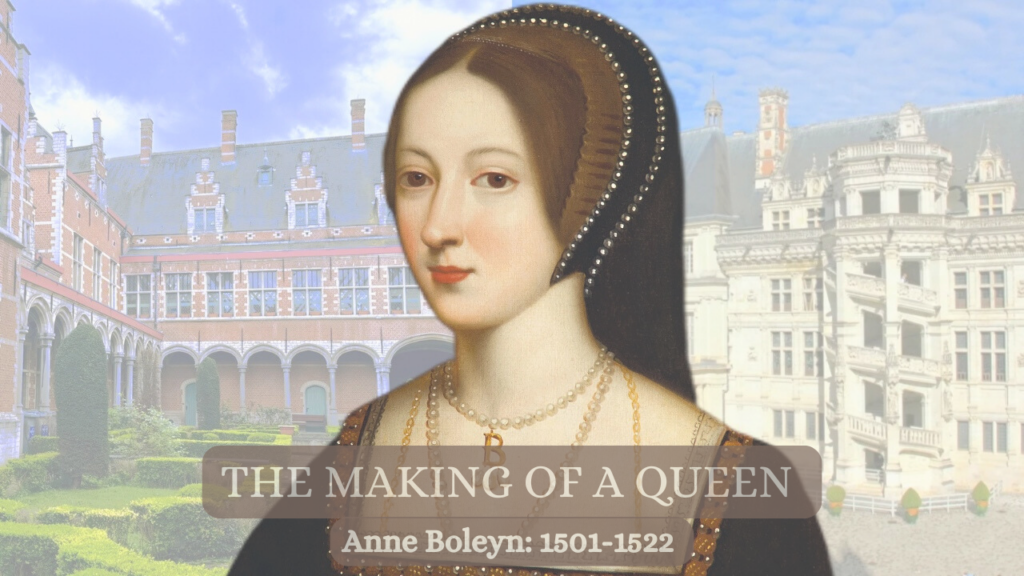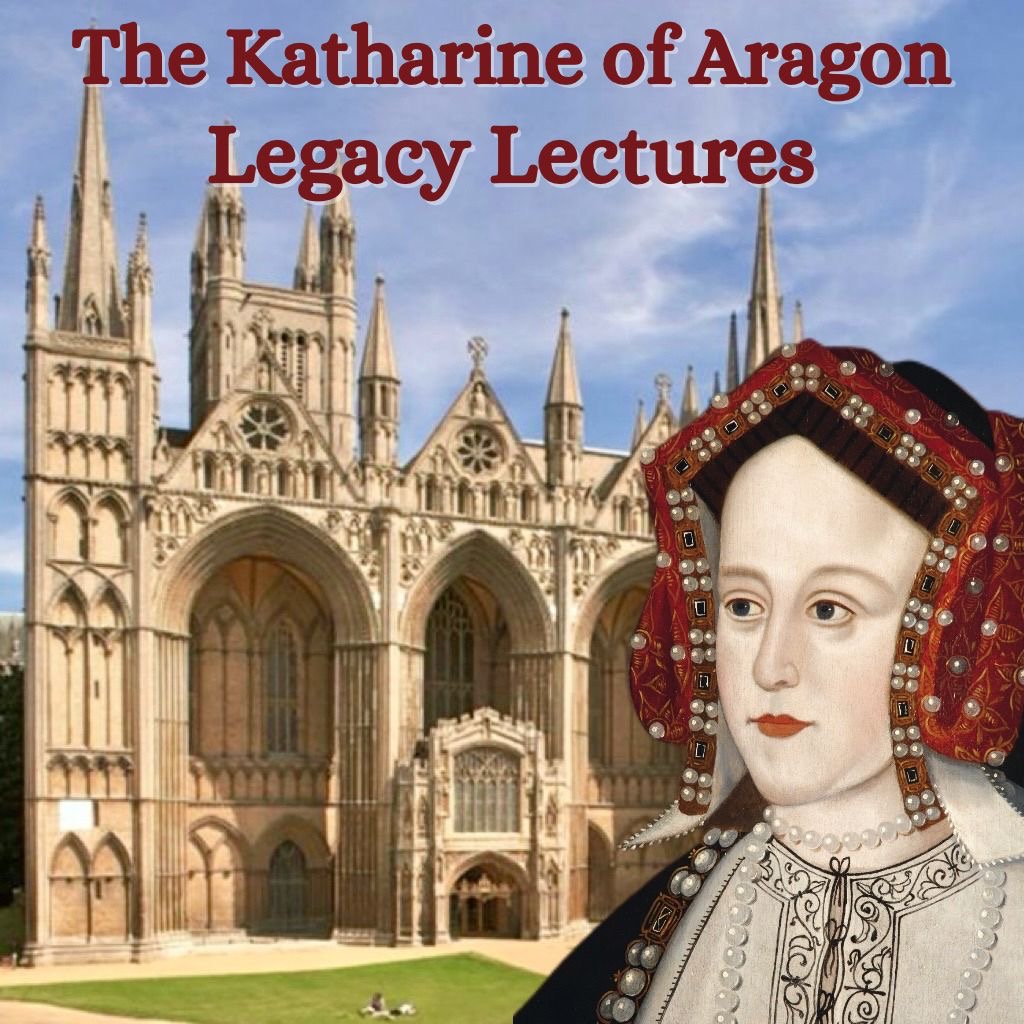 I am delighted to share with you a guest post by Susan Higginbotham, author of The Woodvilles: The Wars of the Roses and England’s Most Infamous Family. To celebrate the release of Susan’s book we are giving away one copy to a lucky commenter.
I am delighted to share with you a guest post by Susan Higginbotham, author of The Woodvilles: The Wars of the Roses and England’s Most Infamous Family. To celebrate the release of Susan’s book we are giving away one copy to a lucky commenter.
Competition now closed!
Conditions of Entry
For your chance to win a copy of The Woodvilles by Susan Higginbotham you must be subscribed to On the Tudor Trail’s newsletter (if you are not already, sign up on our homepage).
Then simply leave a comment after Susan’s guest post below, between now and 27 October 2013.
Thanks to Susan’s generosity, this giveaway is open worldwide!
Don’t forget to leave your name and a contact email.
Good luck!
Elizabeth Woodville’s Move to Bermondsey
By Susan Higginbotham
 In September 1486, Elizabeth Woodville made what would prove to be her last major ceremonial appearance: she served as godmother to her grandson Prince Arthur. Within a few months, she moved to Bermondsey Abbey, a Cluniac monastery on the banks of the Thames.
In September 1486, Elizabeth Woodville made what would prove to be her last major ceremonial appearance: she served as godmother to her grandson Prince Arthur. Within a few months, she moved to Bermondsey Abbey, a Cluniac monastery on the banks of the Thames.
Elizabeth’s removal coincided with, and has often been linked to, a conspiracy against Henry VII which had been building since the previous autumn. The conspiracy, which arose in Ireland, took the unlikely form of recruiting a boy, Lambert Simnel, to impersonate Edward, Earl of Warwick, the young son of the Duke of Clarence. In fact, the unfortunate Warwick was shut up fast in the Tower of London, to which the cautious Henry VII had moved him shortly after winning his crown at Bosworth.
On 1 May 1487, Henry VII, for what is described in classically vague bureaucratic terms as ‘divers considerations’, transferred Elizabeth Woodville’s real properties to her daughter, the queen. According to Polydore Vergil, the decision to ‘deprive’ the dowager queen of her possessions was taken in the midst of a council meeting called at Sheen to discuss the rebellion. Yet the reason Vergil gives has nothing to do with the nascent rebellion, but with Elizabeth Woodville’s 1484 agreement with Richard III to leave sanctuary. The Tudor historian Hall follows Vergil in ascribing Elizabeth’s loss of her properties to her long-ago deal with Richard, adding, ‘By this folly and inconstancy of the queen, she incurred the hatred and displeasure of many men, and for that cause lived after in the Abbey of Bermondsey beside Southwark’. As Elizabeth’s rapprochement with Richard III was old news in 1487, this hardly seems a plausible explanation.
It was not until the seventeenth century, when Francis Bacon wrote his history of Henry VII’s reign, that Elizabeth was explicitly linked to the Lambert Simnel conspiracy:
That which is most probable [is] that it was the Queen Dowager from whom this action had the principal source and motion. For certain it is, she was a busy negotiating woman […] and was at this time extremely discontent with the King, thinking her daughter (as the King handled the matter) not advanced but depressed: and none could hold the book so well to prompt and instruct this stage-play, as she could. Nevertheless it was not her meaning, nor no more was it the meaning of any of the better and sager sort that favoured this enterprise and knew the secret, that this disguised idol should possess the crown; but at his peril to make way to the overthrow of the King; and that done, they had their several hopes and ways. That which doth chiefly fortify this conjecture is, that as soon as the matter brake forth in any strength, it was one of the King’s first acts to cloister the Queen Dowager in the nunnery of Bermondsey . . .
Bacon’s admitted conjecture, arrived at more than a century after the events in question, has for some taken on the aura of historical fact. Yet, as others have pointed out, it defies credibility that Elizabeth would support supplanting her daughter’s husband (and his heir, her new grandson) in favour of the Earl of Warwick. The young earl was the son of George, Duke of Clarence, who in 1469 had been involved in the deaths of Elizabeth’s father and her brother, John. An alternative explanation that has been offered is that Elizabeth believed that Simnel was not Warwick, but her vanished son Edward V. While such a belief certainly would give Elizabeth a motive, the argument is undermined by the failure of any contemporary or near-contemporary source to mention such a claimed identity for the pretender, or such a motive for Elizabeth. Moreover, as the rebellion attracted close associates of Richard III such as Francis, Viscount Lovell, it is difficult to imagine any of them fighting to restore Edward V to the throne when they themselves had helped remove him from it in the first place.
It is possible, however, that Henry VII’s seizure of Elizabeth’s properties was linked to his suspicions of her son, Henry Grey, Marquis of Dorset. According to Vergil, the king, preparing to meet the rebels in battle, arrived at Bury St Edmunds, where, believing Dorset to be privy to the conspiracy, he arrested him and sent him to the Tower. Bacon amplified the story:
And being come to St Edmund’s-bury, he understood that Thomas Marquis Dorset […] was hasting towards him to purge himself of some accusations which had been made against him. But the king, though he kept an ear for him, yet was the time so doubtful, that he sent the Earl of Oxford to meet him and forthwith to carry him to the Tower; with a fair message nevertheless that he should bear that disgrace with patience, for that the King meant not his hurt, but only to preserve him from doing hurt either to the King’s service or to himself; and that the King should always be able (when he had cleared himself) to make him reparation.
Unlike his mother, Dorset did stand to gain from putting Warwick upon the throne: Dorset had been Warwick’s guardian during Edward IV’s reign and had probably hoped to marry him to one of his many daughters. That old tie, combined with Dorset’s defection from Henry during his exile, might have been enough to awaken the suspicions of the jittery king, who after all had good reason to know how easily a ruler could be pushed off his throne. That Dorset was indeed under a cloud at this time is confirmed by the king’s failure to summon him to Parliament that autumn. Nonetheless, whatever reservations the king had about Dorset’s loyalty, they did not extend to the whole of the Woodville family: Elizabeth’s younger brother Edward Woodville not only fought for the king against the rebels but held high command in the king’s army. Furthermore, if Henry did suspect Elizabeth of plotting, Bermondsey, an abbey conveniently located on the Thames, seems an odd place to stow her; there were more secure and more remote locations to which she might have been sent.
It is quite possible that Elizabeth’s removal to Bermondsey was prompted chiefly by financial concerns on the part of the king. The order transferring Elizabeth’s estates is sandwiched in among a number of routine matters of royal business, suggesting that the order had likewise been an administrative matter rather than a security measure. Due to chance and political upheavals, it had been a century since a married king had faced the situation of maintaining a queen dowager while assuring his own queen of her proper landed endowment. Henry solved this problem by transferring Elizabeth Woodville’s lands to her daughter; in recompense, Elizabeth received an annuity of 400 marks, raised on 19 February 1490 to £400. While a different king might have treated Elizabeth Woodville more generously, the events of the past few years had left England on shaky financial ground, and Elizabeth could at least console herself that her daughter was receiving a suitable endowment. She was also not the first queen dowager to retire to a religious house: Catherine of Valois, Henry V’s widow (and Owen Tudor’s wife) had spent her last months at Bermondsey, apparently due to ill health, and Henry III’s widow, Eleanor of Provence, spent her last years as a nun at Amesbury.
Moreover, Henry may have initially thought that Elizabeth would soon have no need of an endowment in England, because on 28 November 1487, he and the Scottish king, James III, agreed that the latter would marry Elizabeth. The negotiations had been carried on pursuant to the three-year truce that the English and the Scots had formed the previous July. It seems highly unlikely that Henry would have agreed to such a match had he believed that Elizabeth had been plotting against him. James’ death in June 1488, however, kept Elizabeth from becoming the Queen of Scots.
Following Elizabeth’s removal to Bermondsey, we have few glimpses of her. We do know, however, that in 1489, Elizabeth Woodville was staying with Elizabeth of York when the latter was awaiting the birth of her daughter Margaret. This belies Bacon’s later claim that she had been ‘banished [from] the world into a nunnery; where it was almost thought dangerous to visit her or see her’. Clearly, she had not been shut off from all contact with her family, although the extant records furnish no clue as to how often she saw or heard from them. Elizabeth of York’s privy purse expenses, which would give us an idea as to whether messages or visits were exchanged between mother and daughter, do not survive for this period (or indeed for any other period other than the last year of the queen’s life), and heraldic accounts by their very nature were concerned only with court ceremonies, not day-to-day interactions.
In June 1491, Elizabeth of York bore a second son, Henry. The birth of the future Henry VIII, the “spare,” did not provoke much comment at the time, and we do not know whether Elizabeth Woodville was a witness to his birth. She could not have left any lasting impression on her grandson, for she died a year later at Bermondsey, leaving Elizabeth and her other children her blessing. Henry VIII could at least look at his grandmother’s portrait, however, for it hung at his palace of Westminster.

















Fascinating article!
Look forward to reading this book about one of the most fascinating women in history and her family,
Excellent article, A thourghly enjoyable author.
Loved the reading…thanks
Fabulous article so I’m looking forward to reading the book.
Love hearing all about the War of the Roses
I’d love to win a copy !
What a fascinating article, and an excellent taster for the coming book 🙂
Cannot wait to read this book Hope I win it!
Fascinating area of history and one of my favourite eras. The betrayal, intrigue and and conspiracies are better than a majority of televised entertainment. This article has piqued my interest further and provides yet another angle to a complex family war. We will never know what really happened but from all the books I’ve read on the cousins war, helps to bring to life a turbulent area in history that inspires so many stories. I believe every child should be shown just how amazing and exciting history can be and enjoy Englands story.
Love reading about history and how it shaped our world!
Great article!!! I find the Woodville’s so interesting! Especially Elizabeth Woodville! Pls enter me in your wonderful giveaway! Thanks
A very good article and the book sounds very interesting. I have read many theories and accounts of The War of the Roses. I have a personal interest as one of my ancestors was Thiabault of Luxembourg, Jacquetta Woodvilles brother.
I like reading this article.
Truly riveting article about a most facinating woman.
I would love to read this book.
I love Tudor time and become in love with them, specially Anne Boleyn after a work I made for school when I was 19. I didn’t know the Woodvilles and I understood better the War of the Roses. I’m anxious to read this book. When will it be in Portugal?
Superb article! The Woodville family was more intriging than the Tudor era.
Hoping to read your book and add the dynamic writing to my library.
I would love to read the whole book. My imagination has been captured by the Woodvilles, and I can’t wait to learn more about them!!
Fascinating time, would love to read this book by one of my favorite authors xx
Thank you for such a great read.
I love reading about England’s history. When thinking of the Monarchy, many think of Henry VIII. But there is so much leading up to him. Thank you for this excellent article.
Loved reading… goes to show you that even though we are separated by centuries, people are the same. They plotted, lied, and betrayed one another just like people today!
So looking forward to reading this book! This was just a tease. This era fascinates me, cannot get enough 🙂
Great article!
Sounds really good! Thank you for the giveaway.
The Woodville’s are a fascinating part of history. The women seem so strong & driven. This book would be a wonderful read.
hoping the book will help with my dissertation
Thank you… Looking forward to this intriguing read!!!
An Interesting article about a pivotal person in the shaping of the tudor dynasty. The book looks like it will be an excellent read.
Interesting article.
I love Elizabeth Woodville and look forward to reading more about her and her daughter, Elizabeth of York.
Very interesting article! Would love to read the book!
Such an amazing article. Really excited about reading this book 🙂 Well Done to Susan Higginbotham on such a great book 🙂
Fascinating article, thank you. Would love to read this book.
This is fascinating to me because I went to Grafton recently. To stand in the footprints of significant people such as Elizabeth Woodville gives me chills. The church is gorgeous. The oak tree under which she and her Grey sons met with Edward is in a different village and that’s my next trip!
I can’t wait to read this book. I love the take on history.
Great article! Would love to read the book.
Reading that article makes me want to read more…….Fascinating…….
I am addicted to War of the Roses and Elizabeth Woodville. Thanks for the article.
Good morning~
Elizabeth Woodville and her family simply fascinate me! I’ve been reading book after book and can;t get enough. Wouldn’t it be incredible to actually meet them!
Remarkable woman in history! Great article. I could read about Elizabeth Woodville all day everyday!
Looking forward to reading the threads of detail that made up such a colorful tapestry of life surrounding Elizabeth Woodville. The article feeds the desire to know more.
Can’t wait to read this new book. I’ve been fascinated with this part of the story for a long time, but found few scholarly works on the time period.
Love the cover! Thanks for the interesting read.
Such an interesting family!
Yes, I love books that capture the real historical treasures of dear ole England. I have alot of english in my blood and find it most intriguing!
Excellent article! I can’t wait to read Susan’s Book!
For over 40 yrs I have so loved reading about Tudor England and have many books to prove it!! I have now branched out to the War of the Roses and am obsessed with all that led up to Henry VIII and his children. The intrigue and backstabbing is worthy of any modern-day soap opera and to learn the truth about this people is something I strive for.
Love this history! Great Reading!
Elizabeth Woodville is an inspirational and forward thinking woman of her time. An interesting insight and I can only look forward to reading more about how this lady crafted security of her own dynasty whilst a new one was forging.